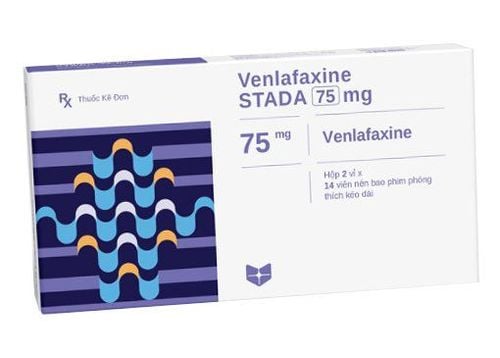This is an automatically translated article.
Besides neurological or brain diseases, most fatigue headaches are caused by spasms of the muscles of the face, neck, and scalp. Tension-related headaches, also known as tension headaches, are mainly caused by the patient's psychology.1. Causes of tension headaches
1.1. Psychological stress, stress is mainly based on the way people see, react and behave towards certain problems in life situations. Stress is also classified as an urban disease because the fast and noisy life here has created favorable conditions for this disease to appear.Symptoms of fatigue headaches are becoming more and more common as many people in big cities have to focus on family and work, without having time to take care of themselves.
When under stress or nervous tension, the body will produce a large amount of the hormone Cortisol and requires a constant supply of energy from fat. This leads to an increase in blood pressure and causes the heart rate to beat faster than it should. Since then, blood circulation also becomes disordered, creating increased pressure on the vessel walls and is the cause of persistent headaches and fatigue. Moreover, the long-term instability in blood transmission increases the risk of dangerous cardiovascular diseases.
Trắc nghiệm: Bận rộn có ảnh hưởng đến sức khỏe của bạn không?
Cuộc sống hiện đại khiến chúng ta vì quá bận rộn mà quên chăm sóc sức khỏe cho chính mình. Ai cũng biết rằng lịch trình làm việc cả ngày có thể khiến bạn kiệt sức, nhưng cụ thể bận rộn ảnh hưởng thế nào tới sức khỏe? Hãy cùng làm thử bài trắc nghiệm dưới đây.
1.2. Weather changes Headaches fatigue stemming from weather changes often occur in subjects who are sensitive to abnormal changes in temperature, humidity, air pressure... In which, dependent Women and the elderly are easily affected by climate factors. Specifically, hot weather will make the body dehydrated, stressed and difficult to sleep. This has adversely affected the nervous system, causing fatigue headaches to appear and recur, eventually becoming chronic headaches.
1.3. Vestibular disorder Vestibular disorder is a condition in which the nervous system is damaged due to stress syndrome. In which the 8th nerve, responsible for transmitting information, is negatively affected, causing the vestibular system to no longer function correctly and according to the body's requirements, thereby causing manifestations such as anxiety, stress, and anxiety. stress , insomnia and especially headaches , fatigue .
1.4. Other factors The cause of the muscles under the scalp or neck area to become tight and trigger a headache fatigue can also be due to a number of factors such as:
Eating too full or too hungry; Abuse of alcohol; Noise pollution; Work pressure Collisions, head injuries; Depression ; Holding one position for too long; A few other medical conditions.

2. Symptoms of Tension Headaches
To distinguish it from the signs of other neuro-cranial diseases, the common symptoms of tension headaches are listed as follows:Always have a feeling of a towel around the head or a tight belt head; Heaviness in the head and dull pain throughout the day, sometimes with pain in the nape of the neck; Impaired concentration, difficulty sleeping; Pain levels increase with stress, fatigue, or listening to noise; The muscles of the face - neck - head are stiff; Sometimes I feel a knock in my head. Headaches like the above can be a sign of many diseases that are difficult to treat. Typically, the symptoms of a tension headache will last for several hours a day. If the patient arbitrarily takes painkillers regularly, continuously from 3 days to more than 1 week, the pain may decrease at first but will be repeated, creating a vicious cycle. See your doctor if the pain is increasing, accompanied by vomiting, numbness in the face, weakness in the limbs, or visual disturbances.
3. Diagnosis and Treatment of Tension Headaches
3.1. Diagnostic Steps To diagnose a patient's symptoms of tension fatigue headache, the doctor will dig up information about the medical history, conduct a physical exam, and ask some questions related to the symptoms. problems such as:When the headaches started; Location, pattern of pain and severity of pain; Accompanying symptoms, such as feeling weak, feverish, vomiting, or visual disturbances; Past accident or trauma; Medicines taken before the headache; Family and personal history of headache; The possibility of stress in life; Many cases of tension headaches are misdiagnosed with migraines, which can sometimes be difficult to tell apart.
3.2. Treatment Process Muscle spasms and pain can be relieved by the following measures:
Use common pain relievers (such as Aspirin, acetaminophen, ibuprofen); Exercise - sports and relaxation exercises to relieve stress; Do physical therapy or use specialized muscle contraction equipment; Prescribe stronger pain relievers for severe cases. Headaches caused by long-term stress can cause metabolic disorders, making the body not absorb enough nutrients for a long time. In more severe cases, a constant headache will cause nerve exhaustion and even lead to a stroke at any time. Therefore, patients should avoid self-medicating or abusing home remedies for pain relief. Instead, it is necessary to visit a medical facility to consult a doctor for professional advice if you have a tension headache that causes a lot of fatigue.
4. Prevent fatigue headaches

Resting in a dark room; Take painkillers early to take effect quickly; Massage the nape of the neck, shoulders, and back or apply cold/heat. The characteristic of tension headaches is that they will recur many times, causing a lot of fatigue for the patient. Therefore, patients also need to actively prevent this symptom in their daily routine. For example:
Playing sports makes the body healthier, slows down the aging process and reduces stress after intense work; Maintain optimism, a sense of humour, and avoid stressful situations; Consult a psychologist if you are under severe stress; Learn to relax, exercise regularly, eat right and get enough sleep; Don't work too hard, don't smoke, don't drink a lot of alcohol. The Department of Neurology - Vinmec Times City International General Hospital has the role of examining and treating diseases related to the central and peripheral nervous systems. With a team of seasoned medical - doctors with 20 - 40 years of experience, such as Associate Professor, Doctor, Doctor Chu Hoang Van; Specialist doctor I Vu Dung Kien,... Vinmec Times City has successfully diagnosed and treated neurological diseases, including headaches, fatigue, dizziness, tension, stress, and money disorders. family... for many patient cases.
Patient care services of Vinmec Times City International General Hospital are not only comprehensive and diverse, but also of high standards; accompanied by a system of modern equipment, absolute sterility - worthy of becoming the address of fatigue headache due to stress trusted by many customers.
For detailed advice on examination and treatment of neurological diseases, you can contact Vinmec Times City by calling Hotline 0243 9743 556 or register for online examination and consultation HERE.













